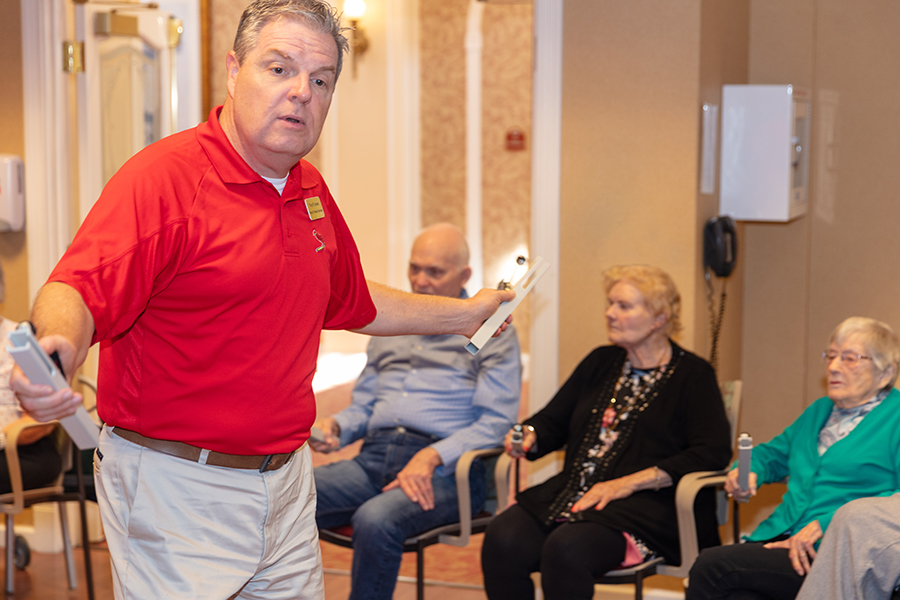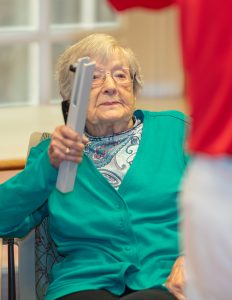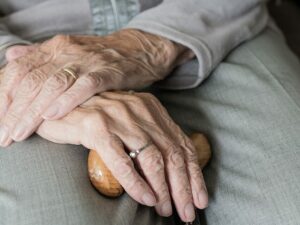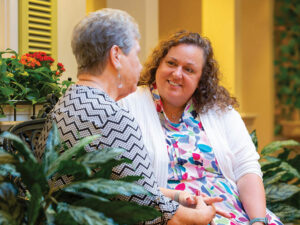Making Music, Making a Memory
We use our senses to stay in touch with the world around us. We see, we touch, we listen, we smell, then use the feedback from these moments to help shape who we are, understand where we are and identify what we need and want. Bread baking in the oven, maple trees turning red, turning pages in a favorite book, a familiar piece of music coming through an amplifier – all of these sensory impressions help shape us as individuals and as a culture.
People living with Alzheimer’s disease and other forms of dementia are essentially no different. Sight, sound, taste, smell, touch: These are the keys that unlock doors of memory and cognition.
At least once a week, Troy Jones visits Parc Provence brining music — and its ability to touch and reach others — with him in the form of handchimes. The therapy he offers through these simple musical instruments can have a profound effect on the people who play them, especially those with cognitive impairment.
Why handchimes? They produce a mellow and pleasing sound, are lightweight and easy to manipulate, and are easy to learn to play.
Troy notes that, in addition to being satisfying to use, handchimes offer therapeutic benefits to Parc Provence residents. When someone joins Troy and others in a handchimes session, loneliness and isolation can dissipate. And those who choose to attend but not play benefit just by being in the room as observers.
Playing handchimes offers other benefits, too. Participating in a group that has a specific purpose can offer a sense of belonging. It helps friendships form with others in the group, offers real opportunities to focus and learn, and provides opportunities to communicate, negotiate and compromise as the group works to choose music and themes for concerts.
As with any group activity, participation in a handchimes group also encourages independence and fosters decision-making skills. People with cognitive diseases need these kinds of opportunities as much – if not more – than others. Too often, the cognitive disease can diminish a person’s self-worth. When a group of disparate people, each bringing their unique strengths and weaknesses, chooses to work together on a common goal, everyone benefits.
As people with Alzheimer’s find, they need to turn over some of their decision-making to family members and caregivers, they can experience a deep sense of loss. But when they find an activity that is both challenging and pleasurable, they can regain some of the autonomy they previously enjoyed. Even simple decisions – voicing an opinion about what to play and how to play it, for instance – can help shore up a waning sense of self.
A handchimes session also fosters fun and a sense of playfulness. Troy notes that members of the handchimes choir often find things to laugh about as they practice, and they grow to appreciate each other’s sense of humor.
The act of making music is a cognitive endeavor. Participants must listen and respond to others, negotiate, communicate, plan and problem-solve. Whether one is actively or passively engaged, music can spark a memory, elevate mood and facilitate cognitive function.
Parc Provence offers a team of certified and skilled therapists. Troy Jones and his handchime sessions are just one of the many ways we care for our residents. If you’d like to learn more about our extensive activities program and how these forms of therapy benefit the people we support and care for, we’d love to hear from you. We’re happy to answer your questions and schedule a tour of our community. Call 314-697-2081.







